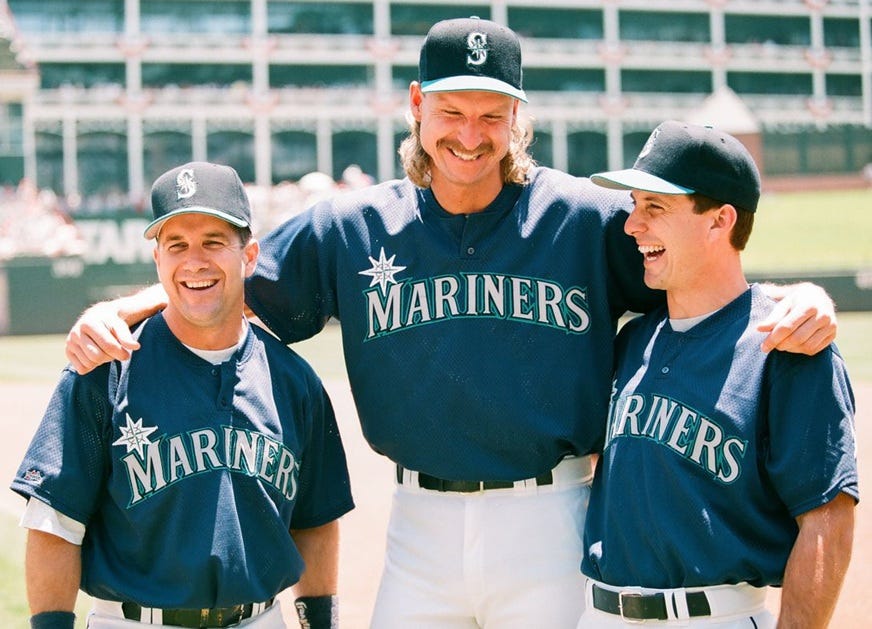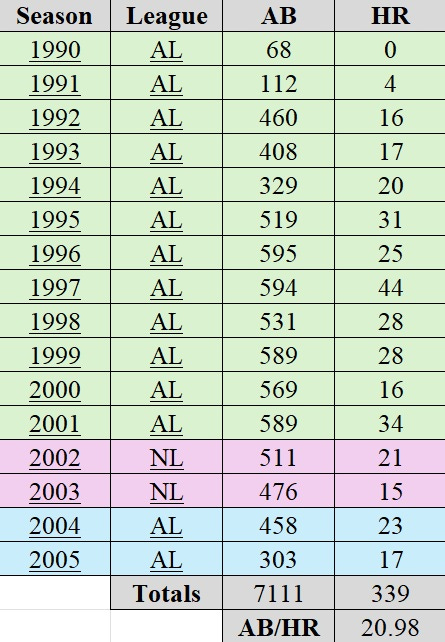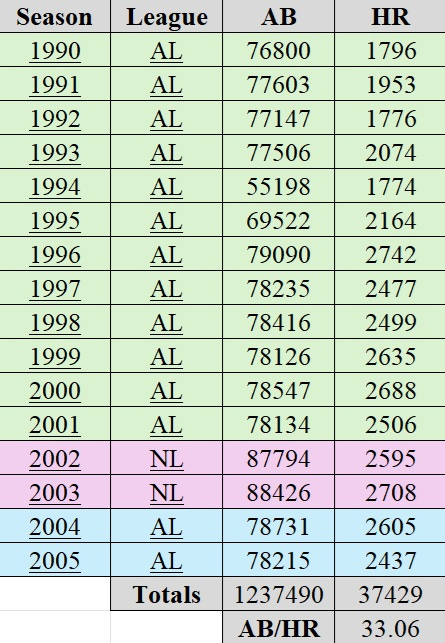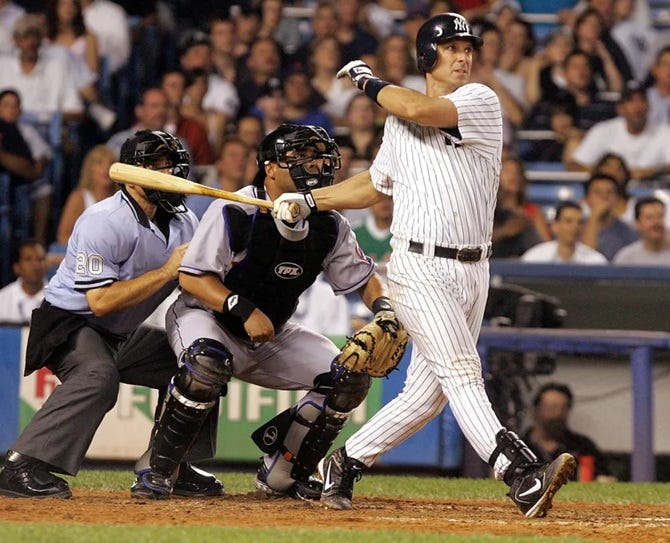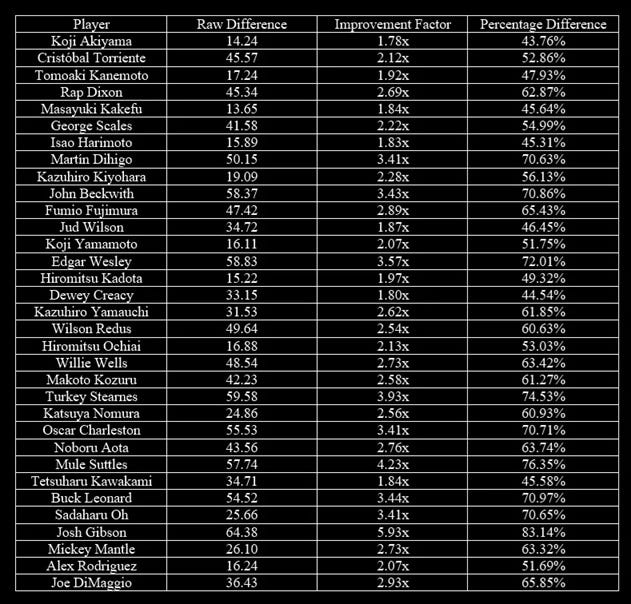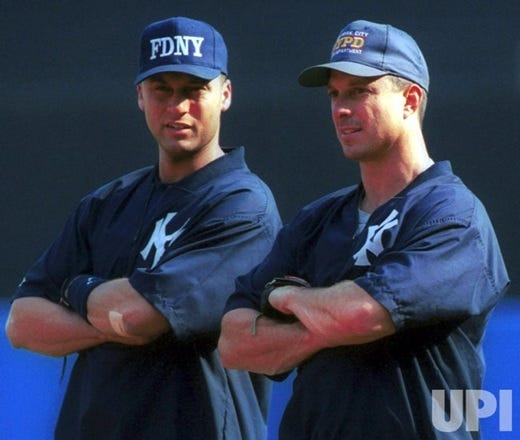This project aims to determine the greatest home run hitter of all time by comparing each slugger’s statistics to the average of their era using three formulas. The final adjusted stats will then be used to compare them head-to-head with other all-time greats.
Tino Martinez will be the next legendary MLB slugger examined in this study. For a brief biography of Martinez, please click here.
Before analyzing Martinez's career numbers, it's essential to recognize his accomplishments as a hitter. Let's examine his rankings in key hitting statistics throughout his career. Martinez appeared on the MLB leaderboards in the following categories:
1997: #7 (343)
1995: #10 (35)
1997: #4 (44)
1997: #6 (77)
1997: #8 (13.50)
Now that we have a clear understanding of Martinez's accomplishments, we can proceed with the career analysis. According to Baseball Reference, Martinez’s official statistics reveal a total of 339 home runs over 7,111 at-bats resulting in an average of at-bats per home run 20.98 (AB/HR).
Tino Martinez played in the American League (AL) from 1990-2001 and again from 2004-2005, he also competed in the National League (NL) from 2002-2003.
When aggregating the statistics from each of the seasons Martinez competed in, the league totals include 1,237,490 at-bats and 37,429 home runs, resulting in an average of 33.06 at-bats per home run (AB/HR).
With this data, we can evaluate how Martinez’s performance compared to the average NL/AL hitter of his era.
Raw Difference: 12.08
Formula: League Average – Player Career AverageImprovement Factor: 1.58x
Formula: League Average / Player Career AveragePercentage Difference: 36.54%
Formula: (League Average – Player Career Average) / League Average × 100%
Martinez’s AB/HR:
Martinez hit a home run once every 20.98 at-bats. That’s a solid power-hitting rate for a first baseman during his era (1990–2005), which spanned the tail end of the pre-steroid era and the height of the steroid era.
League Average AB/HR:
Across the AL and NL during Martinez’s career, hitters averaged a home run every 33.06 at-bats. This reflects a league-wide power output that spiked in the late 1990s and early 2000s due to the nature of that particular era.
Raw Difference:
Martinez needed 12.08 fewer at-bats per home run than the league average, a clear sign of above-average power.
Improvement Factor:
Martinez was 1.58 times more efficient at hitting home runs than the average hitter.
Percentage Difference:
His AB/HR was 36.54% better than the league average, reinforcing his edge in power production.
Martinez’s 20.98 AB/HR is impressive, especially when stacked against the league’s 33.06. He wasn’t just a run-of-the-mill slugger—he consistently outperformed the average hitter of his time in terms of home run frequency.
The 1990s and early 2000s saw a home run boom (think McGwire, Sosa, Bonds), yet Martinez’s stats hold up well. His 339 career homers and his efficiency (20.98 AB/HR) suggest he was a tier above the typical hitter, even in a power-heavy era.
This positions Martinez as a standout first baseman of his era, blending consistency with steady power in a time when home runs were flying.
In our initial case study, we analyzed the careers of prominent Japanese and Negro League sluggers, alongside MLB greats Mickey Mantle, Alex Rodriguez, and Joe DiMaggio for comparison.
Now, let's compare Martinez’s career statistics against these baseball legends to gain a clearer perspective on how he stacks up.
We’ve previously analyzed the power hitting careers of Vladimir Guerrero (14.40/1.79x/44.23%) and Vinny Castilla (13.04/1.61x/37.95%). Martinez’s and Castilla’s figures closely mirror one another with Castilla slightly edging Martinez.
All three of these MLB hitters are the in the statistical orbit of Koji Akiyama. Akiyama hit 437 home runs and had 7,997 at-bats. His Raw Difference was 14.24, with an Improvement Factor of 1.78x and a Percentage Difference of 43.76%.
If you find this content valuable and would like to support the ongoing studies and articles, your contributions via CashApp are truly appreciated.
Your support helps fund the tools, research, and time dedicated to these projects. Every contribution, no matter the size, plays an important role in keeping this work going.
If you're unable to contribute financially, sharing this article on your social media (X, Facebook, etc.), emailing it to a friend, or texting the link to a fellow baseball fan is just as valuable.
Thank you for your support!





